Parents are confused? Experts come to help ——The trend and choice of studying abroad under the epidemic
The epidemic has brought many obstacles to international exchanges. The shrinking of visas and the cancellation of examinations have brought confusion and challenges for students whether to choose an international education route and how to deal with sudden changes.
The convoy plan and the Shanghai Youth International Exchange Center will plan a series of lectures on the academic growth planning of international talents in the post-epidemic era from May 31 to July 4, grasp the sources of information channels, gather expert resources, and interpret changes in the international situation Assist parents and students to correctly understand the status quo, get out of confusion, respond rationally to the impact, and plan the path of study and growth. Courses will continue to be launched on the Convoy program online course platform.
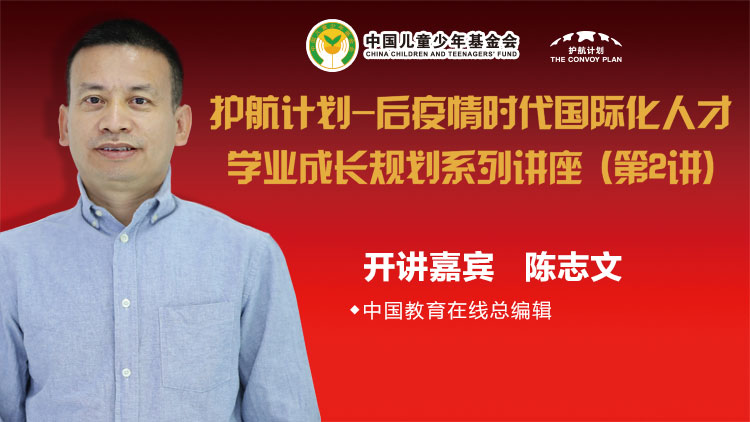
In the lecture on June 5th, Chen Zhiwen, the editor-in-chief of China Education Online and an expert in education reform and governance research, gave a wonderful exposition on the topic of "Trends and Choices for Studying Abroad under the Epidemic". The audience used "excellent" "Be grounded" and "long knowledge" describe the feelings after listening, and the audience commented: "The editor-in-chief Chen spoke very well and fits the actual situation. The parents' most concerned issues have been grasped."
What pulse points did the editor-in-chief Chen cut into the parents, so that everyone listened so deeply and gained something? Next, take a look at the highlights. (The space is limited, and the wonderful content cannot be described in detail. Scan the QR code at the end of the article to watch the lecture replay. Please check the relevant views in conjunction with the lecture video.)
The impact of the epidemic on studying abroad and expert advice
Analyze the impact of the epidemic on studying abroad from two levels:
Macroscopically, the epidemic has brought the trend of studying abroad, which has been sluggish, to an inflection point ahead of schedule.
At the micro level, the current policy is not as difficult for individuals as they might think.
Macro trend analysis:
Before the epidemic: Studying abroad is approaching the top of the mountain, the turning point is about to appear, and the potential for development is weak.
United States: The growth rate and absolute increase in the number of students studying in the United States has continued to decline for 10 years, the number of graduate students applying for the United States has continued to grow negatively, and the growth of studying in the United States has been weak and will soon peak.
United Kingdom: Some people say that the deterioration of the environment for studying in the United States has led to a surge in studying in the United Kingdom. However, careful analysis shows that the total increase this time does not exceed 20,000. Compared with the stagnant growth trend, it is prominent, and the absolute number is limited.
Canada: Similar to the trend in the United States, the growth rate and absolute number of students studying in Canada has shown a downward trend in recent years, which is at the lowest point in the past 10 years.
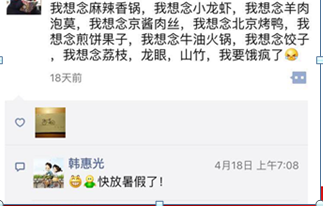
Investigating the reasons, the editor-in-chief Chen gave three points of analysis: 1. The normalization of studying abroad, the decline in the value of gilding, and the low input-output ratio make some people dispel the idea of studying abroad; 2. It stems from the concept that going abroad means suffering. After 05, the willingness to study abroad is low; 3. The development of domestic higher education and the expansion of degree enrollment have reduced the number of students studying abroad because they failed to enter the university.
The impact of the epidemic may be short-lived, but if the trend has been rising and weak before the epidemic, then the occurrence of the epidemic will surely cause the inflection point to come early. Therefore, Editor-in-Chief Chen made the following judgments regarding the development trend of studying abroad after the epidemic:
After the epidemic: accelerated decay, trapezoidal shape into triangle.
Taking the international study abroad trend model as a reference, predicting China’s study abroad trend is roughly a development model:
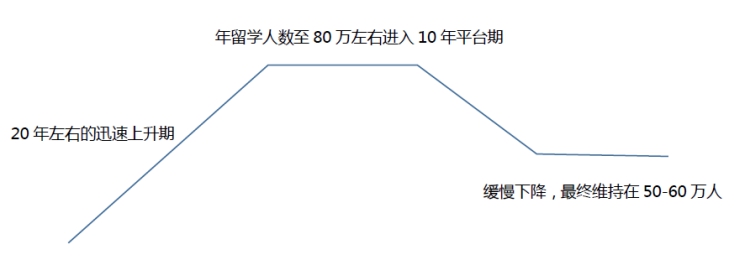
However, after the outbreak of the epidemic, the environment for studying abroad has rapidly deteriorated. In addition, the economic situation of Chinese parents has been affected by the epidemic, and the willingness of Chinese students to study abroad has been further reduced. This allows the "top of the mountain" to arrive early, the plateau period is no longer, and the number of people will decline rapidly in the short term-the development trajectory of the trapezoid has changed to a triangle.
But overall, the total number of people studying abroad in the future will still hover around 600-700,000, at least not less than 500,000.
As for the trend of studying abroad after the epidemic, Editor-in-Chief Chen also made five speculations: 1. Primary and secondary students’ willingness to study abroad has dropped significantly; 2. Undergraduates’ willingness to study abroad has shrunk slightly; 3. Due to employment pressure, postgraduates may experience reverse growth in the short term; 4. The trend of studying abroad is further diversified. Japan is expected to become a star country for studying abroad, and the number of students studying in Germany is also likely to increase; 5. More people choose domestic international schools and cooperative education programs.
Analysis of the impact of the epidemic on individuals:
The epidemic has made admissions easier. In order to ensure the registration rate, the school has relaxed the admission criteria this year, and the situation is expected to remain the same next year. It's just that prestigious schools are still difficult to enter, and ordinary schools can feel the benefits.
The weight of school grades (GPA) and interviews increased. Many exams have been cancelled this year, but there is no need to worry. The GPA will be amplified as never before, and schools may increase the weight of interviews in admissions.
Should I get an offer this year? After judgment, this year North American schools will start offline courses normally, but at the same time, students who do not return to school are also allowed to take online courses; in Europe, offline courses are the main ones. Whether you want to go or whether you can go, everyone considers it for yourself, and you don't have to magnify the risk too much.
Will the United States reject Chinese students? On May 29, the US White House issued a ban on Chinese students, which triggered an upsurge of public opinion. On June 2nd, the US State Department urgently held a press conference to emphasize that it continues to welcome Chinese students. Chinese students bring a huge trade surplus to the United States, and large-scale visa rejections are impossible.
Do we still want to study abroad in the current complex background? It is difficult to give personalized advice on this point. In principle, students are actively advised to go out and take a look when economic conditions permit. Not for gilding, but for cognition of the world and positioning of oneself. The best time to go abroad is at the graduate level, and undergraduate level is also acceptable, but I firmly disagree with going abroad at the primary and middle school level, and the rate of abolition of studying abroad is extremely high. It is recommended that parents wait until the undergraduate level before sending their children abroad for further study.
How to get into a good university
Perhaps it is difficult for the whole world to find a second nation like us, and it is necessary to give children the best education. In order to help parents send their children to better schools as much as possible, Editor-in-Chief Chen focused on the American college admissions system, especially the misunderstandings of domestic parents and traps in the industry. Here is an excerpt for everyone.
Britain is the assembly line, the United States is the skilled worker
The UK is closer to China, and the score basically determines what kind of school to go to. Applying to a British school is relatively clear, while applying to a US school is relatively complicated.
The core principles of American university admissions-what is good besides studying well?
The source of the current application review system in the United States—most of the super-first-class schools are private schools. The score-only theory has enabled schools to recruit a lot of students who are good at learning. In the future, most of them will be middle-class. Schools are mainly financed by social donations. This situation makes schools fall into Economic difficulties. Harvard University was the first to make a breakthrough, adding family background checks to the application. After decades of continuous development and improvement, it gradually formed a summary-from recruiting "best learners" to recruiting "more promising people in the future."
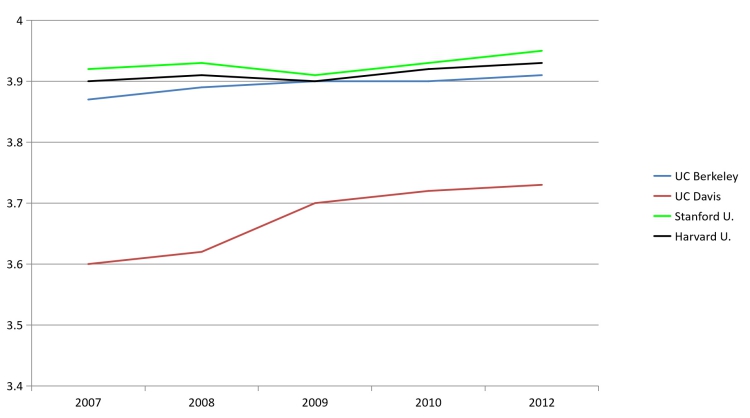
Misunderstandings about admissions to American universities-not looking at grades?
Many people say that American universities do not look at grades, but on overall quality. Editor-in-chief Chen emphasized that achievements are always the first! For super-first-class universities, grades are the threshold. The president of Harvard University did say that Harvard does not look at grades, but the premise is that everyone is close to full marks and there is no choice but to look at the outstanding characteristics or achievements other than grades. For other universities, the core indicator is performance.
Misunderstanding of grades-GPA is not important?
Among the various scores, the most important score is GPA. SAT and ACT are indirect scores. TOEFL is only a threshold score. You must be cautious when providing AP scores!
The core of the score is the grades (GPA) of 4 years of high school (China is 3 years of high school + third year). SAT and ACT are translated into American college entrance examination by many people. This translation is wrong, and their value is actually to verify GPA Gold content.
Relatively speaking, the TOEFL is the least important score. It is a proof of language ability. For example, if the school requires a TOEFL score of 100, then you will not have a competitive advantage with a score of 120.
AP is the icing on the cake and is used to prove that "learning is free." It is not recommended to provide the school with less than 5 points in the test, otherwise the points may be reduced instead.
Misunderstanding of "social activity"-don't be limited by translation
The domestic general translation as "social activity" is actually not limited to this. Editor-in-chief Chen prefers to call it "a person's traits"-what distinguishes it from others, including social activities, specialties, competition results, technological inventions, top sports competition results, etc.
In addition, you must pay attention to the following three points when submitting social activities: 1. Ease of embodiment, a photo, a certificate, and an award are all easy to reflect; 2. Distinction, the design of the activity must be different from others 3. Plan as early as possible. The social activities that you participate in until the second and third year of high school are completely different from those you participated in in junior high school.
Common Admissions Trap-Admissions Officer
Many intermediaries often use admission traps in publicity-admissions officers use Harvard admissions officers and Yale admissions officers as gimmicks. Unfortunately, more than 90% of the people I see are admissions officers, which are equivalent to the marketing department of a company. Their function is to promote the school in various countries and schools, not to participate in the admissions process. Even if you really see the admissions officer, its biggest role is to familiarize yourself with the school rules, and then provide you with suggestions to use the rules, but it cannot decide whether to admit you.
Common admissions mistakes-interview
Many intermediaries often say "interviewers". We can easily imagine interviews in the United States with Chinese thinking, but the actual interviewer is like a temporary worker. Schools often hire an alumni, and the interview process is more to find out whether you have problems or cheating, so to a large extent, the interviewer does not decide whether to admit you. If he recommends you, it is equivalent to the most trusted letter of recommendation for the school; and if you find a place where you are cheating, you will be "killed with one move."
Choose professional advice
STEM major is recommended in principle. What the world needs more is science and engineering talents, and it is easier for children who graduated in science and engineering to find jobs.
In addition, you don’t need to be too entangled in the choice of majors. It is very convenient to switch majors in the United States, and there will be opportunities to adjust in the future. Majors with a lot of room for adjustment include mathematics and statistics.
Editor-in-Chief Chen emphasized in the summary that the world situation has changed dramatically, and what is behind the epidemic is a watershed in the development of the entire world. China’s development faces many international challenges, and we must equip ourselves with studies.
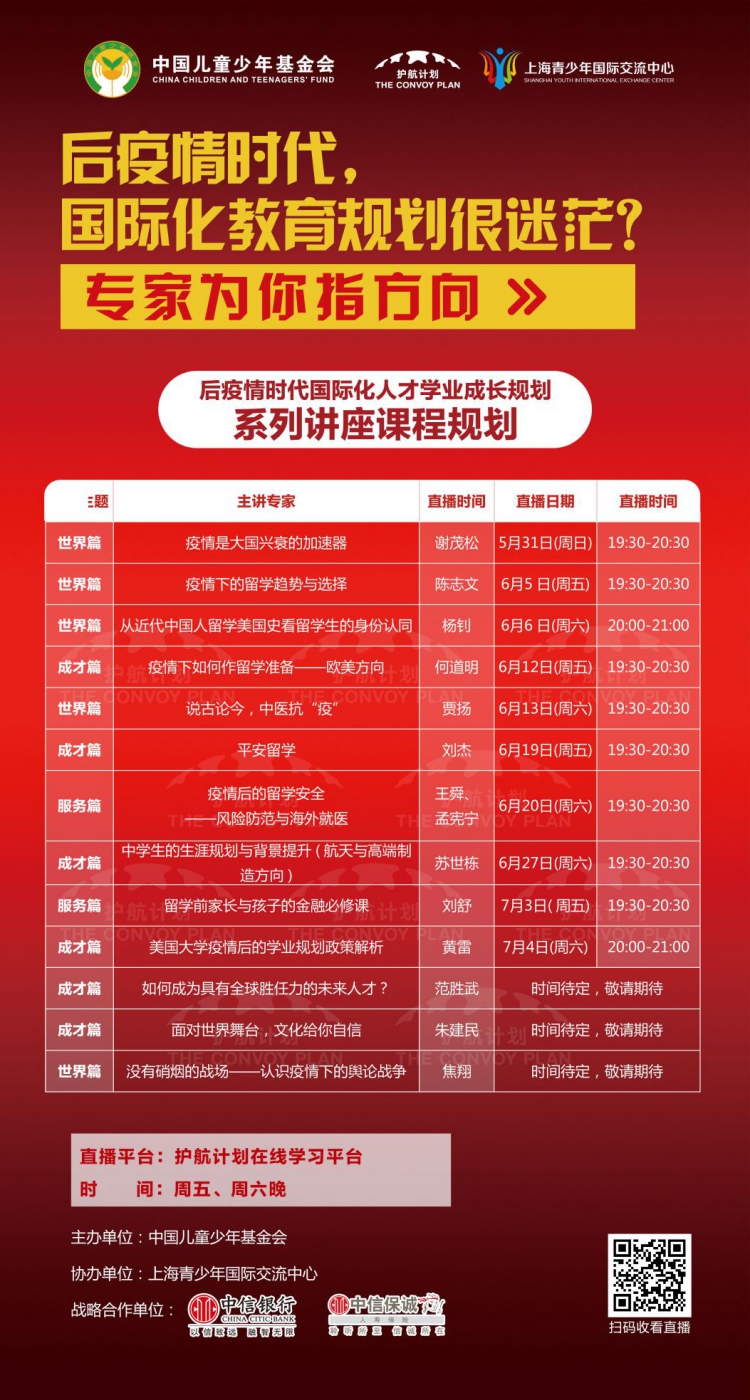
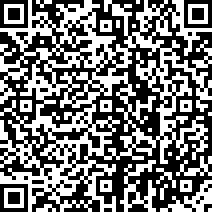
(Scan the QR code to watch the lecture video)